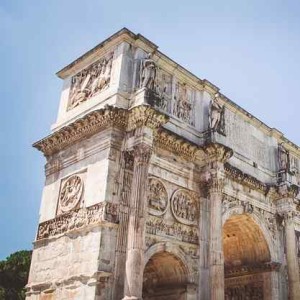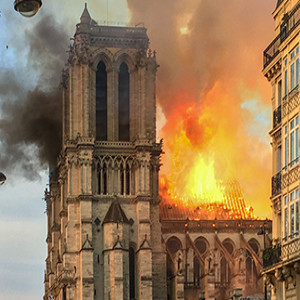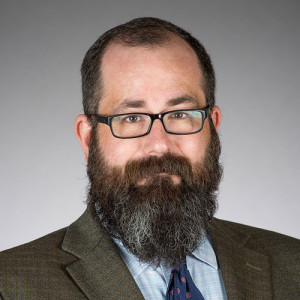Episodes

Wednesday Apr 24, 2019
Post Christian: World War I Museum
Wednesday Apr 24, 2019
Wednesday Apr 24, 2019
Two weeks ago I went with some friends to Kansas City. I drove through Kansas City once in I-70 in 2016, but I had never stopped before. Turns out it's a wonderful place, and I really want to haul my brother and his family there sometime to catch a game at Kauffman Stadium, with all the attractions directed toward children, and eat a lot of barbeque and drink some Boulevard beer.
We went to the jazz museum and the Negro Leagues museum, as well as the World War I museum. When we asked why it was in Kansas City of all places, the answer was that no one else had one, so they figured why not. Given Kansas City's location, an enormous number of soldiers passed through by rail on their way to and coming back from Europe, an enormous fraction of the total number from the West, so there's at least that much connection. In any case Kansas City dedicated a prominent hilltop to this museum. It has an enormous pillar that you can ride up to get the most elevated view of the city (aside from aircraft).
With Darcia Narvaez' words about egalitarianism in my mind, I reflected (as I have often done in the past) on the absolute madness of World War I. Understanding how it started seems easy to me, but I cannot imagine how the war continued through the end of 1915, let alone ground on for three additional years. The question of why the leaders of the countries involved kept ordering their men to fight I set aside for today; the question I am interested in is why the common soldiers and civilians did not revolt years earlier than they did. What gave them such durable loyalty to the aristocratic and oligarchic governments that sent them to such fruitless slaughter?
Based on what I know of ancient and medieval Europe, I find the men of World War I far more ready to acquiesce to authority than their forebears. Can you really read the history of the Hundred Years' War, the Wars of the Roses, or the whole sorry tale of the Holy Roman Empire and its "rights of private warfare" and imagine that those states could ever have forced their subjects to such extremes? How long would any army of Crusaders have stayed in those trenches, with nothing better than the War Ministry's authority to compel them?
There are far too many reasons to discuss in a blog post, but I want to bring up one axis before I close. The states of Europe of the early 20th century were fired by nationalism, tribalism writ large. I have heard that although many, many aspects of human culture are mutable, one unshakable aspect of sociology is our tendency to identify in-groups and out-groups, to designate some human beings as our enemies and in essence to deny them humanity. Europe of the Middle Ages had their national identifications, but their local identity was in many cases stronger and more important, and they also had the overarching sense of brotherhood in a common faith, family, and indeed in the most visceral Christian image, they had an awareness of themselves as one body in Jesus of Nazareth. They betrayed this understanding regularly, but they balked at the kind of slaughter that makes World War I stand out as a satanic spectacle in the history of our species.

Monday Apr 22, 2019
Monday Apr 22, 2019
Today we present the second half of the interview with Darcia Narvaez, social scientist at Notre Dame and a specialist in childhood inculturation, attachment, and bonding issues.
We start out this half of the interview with a discussion of what Karl Polyani called the "great transformation" of European society, involving the breakdown of the pre-modern order and its safeguards for a stable population by means of understandings about community use of land, perhaps resulting in the popularity of emigration to the New World by dispirited, dispossessed, and to some extent dangerous people.
Several times Darcia disparages "hierarchy," understood in its general sense of social stratification, which she or other who have influenced her theorize to have caused huge social catastrophes, including the corruption of the Christian Church by its integration into the late Roman state and the collapse of populations and cultures in the New World on contact with the colonizers from Europe. Late in the podcast I ask her explicitly whether there is any benefit to civilization... let us know in the comments on Facebook or Podbean what you think about the answer!
Darcia's claim is that humans are by nature more egalitarian than other animals. This goes right down to childrearing, where human children, born so completely needy, have an innate expectation that their requests for assistance will be met. She comments that there is a Native American word, "wetiko," that was used to describe an attitude thought of as akin to a sickness that characterized those who acted in an aggressive and exploitative way toward others. Whether or not premodern peoples were all more free of this, it's certainly a common feature of civilized peoples. The Old and New Testaments certainly testify to this, and the need to confront it with compassion and an egalitarian attitude. We discussed the specific example of the disease of the large organization, society, business, or government, in which those at the top are simply disconnected, both intellectually and morally, from those at the bottom.
We mentioned subsidiarity, and might have mentioned clericalism... the social science of these concepts will hopefully be fodder for future podcasts.

Friday Apr 19, 2019
Post Christian - What Are Churches For?
Friday Apr 19, 2019
Friday Apr 19, 2019
Photo by LeLaisserPasserA38 - Own work, CC BY-SA 4.0, https://commons.wikimedia.org/w/index.php?curid=78064310
I was minding my own business, trying to do a little work on my aunt's laptop while mine is in the shop, when I noticed this Washington Post article about 1) massive donations to repair Notre Dame de Paris after its roof caught fire on Monday, taking the 19th century spire with it, and 2) criticisms of the hyper-wealthy people who will open their checkbooks to replace a European landmark but not whatever other social causes the critics think most important.
My first thought on seeing the fire was simply, "How does this still happen?" Fires have of course consumed any number of cathedrals, palaces, temples, city halls, fortresses, and other buildings of note over the centuries, but we have an awful lot of fire suppressant and monitoring technologies these days. Repair work of some kind was already going on as shown by the scaffolding over the roof prior to the fire.
The article drew out a second line of thought that had been lurking in the back of my mind. France is of course the birthplace of modern Western secularism, the country where the hypocrisy of the Catholic Christian establishment yielded directly to the raging adolescent fury of revolution. It is where the modern pattern of punishing Christianity for the sins of the hierarchy and political establishment by pretending it never had any intellectual foundation was first constructed.
It's a mercy, in that environment, that so much of France's medieval legacy survived in the form of art and architecture. In a way it's good that the French opinion of their own culture is so staggeringly high. Yet these churches are so empty. When I visited France in 1998, I was deeply saddened by this. I wandered through many of these churches in Paris, Saint-Malo, Tours, and Amboise. The churches whose names you might recognize are kept up as museums; there are many, less famous, that are falling into decay even within towns like Amboise. The sprinkling of priests and faithful is spread across the remaining churches exceedingly thinly.
It all makes me feel a little better about our situation here in the United States. Still, when my local parish was holding its campaigns to rebuild the 19th century church and 1920s school building, I kept thinking, "I am glad that we can be this generous to repair roofs and redo tuckpointing... how about we put out this effort to fill these buildings with new people hearing the Good News about how Jesus can actually be in their lives after we rebuild them?"
I listened to two podcasts by Bishop Robert Barron and John Stonestreet of the Colson Center about the fire and how it has been discussed in the media. They commented that today's secular culture wants to focus on Notre Dame de Paris as simply a landmark, an icon of French culture, a pretty building from a long time ago. The desire seems to be to strip this structure of its builders' purpose: to construct a memorial to the transcendent human being whose death we commemorate today, and all the truths that come to us after recognizing him. A memorial place in which the True God, the Being upon which all reality is constructed and the Creator that constructed it, could be worshipped in that man's name.
To be fair, I think the culture of modern media does this to almost everything. We live in such a shallow time. When we confront memorials of centuries past, whether buildings like Notre Dame or books or works of art, we would do better to consider for a while why their makers did what they did and whether human beings with a different outlook on life have something to teach us, or to remind us.

Monday Apr 15, 2019
Episode 055 - Darcia Narvaez on socialization and isolation
Monday Apr 15, 2019
Monday Apr 15, 2019
Find Darcia's writings and resources across the internet:
Resource Page at Psychology Today
Topics we discussed in this podcast:
The human need for socialization from the very beginning, and ways that goes awry in contemporary society.
Things we can do to learn some of these lessons later in life:
- Self-calming via breathing, meditation, prayer. (Does our contemporary culture of outrage stem from a lack of the ability to calm ourselves that we are meant to learn starting in infancy?)
- Build a social network. We were meant to have interaction with an extended family that spans all age ranges for proper socialization. It's not too late to play with children, talk to the elderly, interact with people at other stages of life.
- Learn new languages and interact with people in different cultures. What are their reasons for doing the things that they do?
- Spend time with nature.
- Practice going outside yourself, defusing rigid thinking and attachment to "it has to be done this way." Intelligence is a measure of flexibility as much as anything.
Bill asked about social media and our tendency to seek out those who already agree with us. Darcia noted that we need guidance on how to socialize. Up through age 30 or so, it's natural for human beings to get that kind of guidance from others. Unfortunately we get that guidance through TV and video games now.
As usual, this was the first half of our interview. More discussion and more questions than we could possibly answer next time!

Thursday Apr 11, 2019
Post Christian: Money
Thursday Apr 11, 2019
Thursday Apr 11, 2019
Picking up some loose ends from the CNAG post of the same title. I remember the sense of brimming over with things to say when time and a change of focus from the personal to the social and political brought that post to a close, but very little has come back to me in the weeks since.
The core, in any case, and the reason why it calls for a Post Christian post, is the point that the Christian Church risks its integrity by the very fact of being a social institution possessing property and money. Reality dictates that even the persecuted Church has a certain quantity of resources (one thinks of the treasure that his persecutors thought to extract from St. Lawrence) but the legal and above all the official Church tends to accrue tremendous wealth. This wealth contrasts sharply and painfully with the life and teaching of its Founder, who commented that in his wanderings he owned no home (one thinks of the tent that long housed the Ark of the Covenant) and that it was easier for a camel to pass a needle's eye than for a rich man to enter heaven.
This contrast has motivated Christians to take action to restore the integrity, at least in their own personal lives, since before the time of Constantine. Antony went out into the desert, surely not the first Christian hermit but a supremely influential one. Francis, the little poor man, attracted legions of followers seeking authentic discipleship to Jesus, and war was waged for decades and centuries between those who tried to live as other religious did and those who tried to get as close as they could to the theoretical ideal of complete lack of property. The Reformation and the anticlerical Revolutions of the latter half of the second millennium stripped the Catholic Church and its religious orders particularly of their influence, position in society, and much of their wealth.
It seems to me that we are living in the last, dying days of the institutional Church (and Pope Benedict has gone on record in some of his books as thinking much the same). I hope that's the case, because there is something better waiting for us if we get more serious about taking the pieces of the Church we have been given and assembling them, brick by brick at the local level, into something more nourishing and authentic, more concerned for the poor and the needy (which includes not being satisfied with simply handing them material goods to get them through in a state of dependency).

Monday Apr 08, 2019
Episode 054 - TSSM Season 2
Monday Apr 08, 2019
Monday Apr 08, 2019
In this episode we roll out a new format for Season 2.
We recap Season 1 (April 2018 - March 2019) and the three focus areas of the podcast so far:
- Discussion of the fundamentals of the question whether it's reasonable to believe in both science and the Catholic Christian faith, and some exploration of particular topics, like the role of geology in the interpretation of the book of Genesis.
- Review and comments on the speakers at the Society of Catholic Scientists Conference 2018.
- Interviews with scientists and scholars living out their Christian faith, many of whom are actively trying to spread the truth that the presumed conflict between science and religion is false, born from shoddy understandings, strawman arguments, and reactions against hypocrisy. Three of these people (Patricia Bellm, Chris Baglow, and Jay Martin) do this work at the McGrath Institute for Church Life at the University of Notre Dame.
We then go on to discuss our plans for coming episodes, turning to topics of religion, spirituality, and psychology (including topics like child development and addiction) where the intersection of faith and science allows us to build new solutions or give tremendous new life to old solutions to the problems of human life.

Tuesday Apr 02, 2019
Post Christian: Ideals and Means
Tuesday Apr 02, 2019
Tuesday Apr 02, 2019
It's fascinating to me how well progressivism is explained by two aspirations:
- Trying to be more Christian, which is to say more kind, enlightened, truthful, and focused on what really matters in life, than Christians. (A common lie that progressives tell themselves is that Christians really aren't concerned about these things... they are of course aided and abetted by the large quantity of half- or quarter-hearted Christians out there.)
- Trying to do this really impossible thing without any recourse to a God that actually loves them or has any particular purpose for the world.
In reality, of course, something has to give, and that something is either the ideals or the means.
If the means break down, then the progressive is forced to give up on straight secularism and goes searching for some kind of enlightenment... possibly a form of post-Protestant Christianity (or post-Reform Judaism) that they can have on their own terms, or some kind of imported spirituality that can likewise be sampled cafeteria-style to get around whatever it might be in their life that they're not willing to let go: some sexual practice they insist is not only okay, but mandatory, or some pain they suffered at the hands of institutional Christians that they intend never to forgive the church or Church for allowing, etc. Still, this seems to me to be by far the better path. Part of the truth and the power that God gives to humanity, whether or not they know the name and the mission of Jesus of Nazareth, is better than none of it.
If the ideals break down, they seldom break down all the way. Unfortunately, the easiest thing to do is to sneer at other people, the rich and powerful but also the wife-beater-wearing Trump voters, for doing destructive things while making excuses for themselves. They continue to drive their SUVs an hour each way to work so they can live in their 3,000 square foot house in a neighborhood where they feel "safe," i.e., away from black folks. They may post something on social media about how horrible it was that so-and-so molested or sexually harassed people, while continuing to sabotage their own relationships via pornography, masturbation, or just generally refusing to confront their fear to engage in honest intimacy with friends or sexual partners or spouses or children.

Sunday Mar 31, 2019
Sunday Mar 31, 2019
0:00 - The question of relativism vs. hyperrationalism
1:00 - God's love is not a "fact" but, say, hominid ancestry is
1:30 - Tapping into the belief in the rationality of science to bring back belief in reality in faith
2:30 - "Kicking in the back door of relativism"
4:00 - Linkages between theology, philosophy, and science: e.g. logical consistency
5:30 - Effects on the rest of schools that participate in the Science & Religion Initiative
6:30 - Encouragment to integrate, say, history, economics with faith as well
7:00 - Congregation for Sacred Doctrine 1977 "The Catholic School"
8:00 - Faith & literature, arts
9:30 - The true limits of dogma; need to understand how limited Catholic dogma really is, and how non-restrictive
13:00 - Teachers woefully overworked and underpaid, not given the ability to succeed
14:30 - Blessed to have excellent but also humble panelists & experts intending to listen to one another
19:00 - Story of the second & first editions of Baglow's textbook

Friday Mar 29, 2019
CNAG: What's Your Frequency?
Friday Mar 29, 2019
Friday Mar 29, 2019
A return to the idea of frequency dovetails with the influence of the images and other sensory inputs we allow into our minds that Patricia Bellm spoke about yesterday. It also converges with the topic of the NPR Invisibilia podcast episode Post, Shoot from earlier this month.
In that episode, the interviewer spoke with African-Americans, mostly high school age, in Wilmington, Delaware. It examined the situations created by their heavy use of social media, playing around with the imagery of gangster culture and engaging in diss wars with each other that remain confined to their social platforms... except when they don't, and someone gets shot.
I'm aware I am barred from speaking about anything going on in African-American culture beyond the barest facts. So I won't. I don't need to, in any case. I can cruise the streets of Milroy, Indiana, a rural community about as white as white can be, and see my young fellow German-Americans and Euromutts dressing themselves as if to try to fit into that style or listening to that music.
Patricia, how did she put it: "If you eat doughnuts, you will look like a doughnut. If you consume violent video games, you will become a violent person." The cautious scientist in me has to note that of course it's not that simple. Human beings are maddeningly complicated to evaluate and manage from the outside. [Reasonably apropos, and too good a quote to pass up: "Communism would be a wonderful system if only there were no people, and communism would be wonderful in Poland in particular if only there were no Poles."] We have a lot of influences, and no one cultural stimulus is going to dominate the outputs of our behavior except for a small minority of people.
Very few of the white kids watching the video for Trap Queen on YouTube are going to go out and cook up some crack or join a gang so as to have a rival gang with members to shoot. Does that mean that it doesn't have any influence? That would be more of that all-or-nothing thinking that helped our foremothers survive in life or death situations, but didn't help all that much in creating the philosophy or science that have allowed us not to be in life or death situations nearly so often. Of course it has some influence, and of course to tell exactly what nature and how much we are stuck with the uncertain means of statistical social science or the cumbersome ones of brain scanning, but we can look at ourselves and those closest to us and get some sense of the situation.
It should be too obvious to need stating, but once we are in the presence of a song or a movie or decide to start reading a book, we can't consciously choose what elements will influence us and leave the others behind. I'm kind of upset at American culture for feeding me enough stimuli, with no conscious cooperation on the part of myself, my parents, or my teachers, to imbibe the whole gospel (malispel?) of the sexual revolution and have it as an unwelcome part of my mental furnishings. I can't entirely shake the sense that burdened me so heavily as a teenager that if only I was doing what everyone else was supposedly doing (getting laid), I would be happy and my life would be worth living. It takes effort to keep it at bay, and used to take enormous effort that crippled me as far as the work of growing up and finding my vocation was concerned. I watch my diet of AC/DC or Crazy Town (remember th... no, of course not, never mind) or country music in general, because it's just not worth it making things harder on myself.
This all also comes back to the question I posed myself about knowingly filling my mind with fiction. If you're watching Scarface snort cocaine and shoot people, you're distancing yourself from reality. (I sure hope. There is help if part of that is your reality.) Add up enough distance, and it starts to make sense to call it dissociation.
How does this relate to "frequency"? I'm going to go out on a limb here with my modest familiarity with the term "frequency" and my considerable experience with dissociation and say:
Theorem. If surrounding oneself with reminders and expectations of good things and affirming the good that has been placed within you is vibrating at a high frequency, while surrounding oneself with mediocrity and telling yourself you're a fraud and barely getting by is vibrating at a low frequency, then losing oneself in fantasy and living apart from reality is not to be vibrating at all... zero frequency.
Just like absolute zero, no living person is all the way down at zero frequency, but some of us are only at a few millikelvin.

Thursday Mar 28, 2019
Bonus Episode - Patricia Bellm: Compartmentalization vs. integration
Thursday Mar 28, 2019
Thursday Mar 28, 2019
Compartmentalization by students at Notre Dame
Bill: ethics as a checklist
The Science & Religion Initiative (see Baglow & Martin interview)
The need to get the same message in the biology class and in theology class
The change in the teachers after a few days in the workshop: divisions fade out
It's a challenge having an "athletics" teacher in the program (phys ed)...
Yet there are things: doping and respect of the body
Patricia believes "you become what you eat" applies to violent video games as well
Feed yourself and your children good things instead

